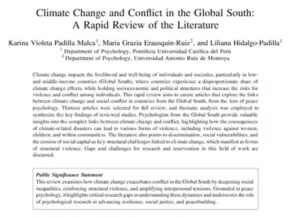
Climate change impacts the livelihood and well-being of individuals and societies, particularly in low- and middle-income countries (Global South), where countries experience a disproportionate share of climate change effects, while holding socioeconomic and political structures that increase the risks for violence and conflict among individuals. This rapid review aims to curate articles that explore the links between climate change and social conflict in countries from the Global South, from the lens of peace psychology. Thirteen articles were selected for full review, and thematic analysis was employed to synthesize the key findings of reviewed studies. Psychologists from the Global South provide valuable insights into the complex links between climate change and conflict, highlighting how the consequences of climate-related disasters can lead to various forms of violence, including violence against women, children, and within communities. The literature also points to discrimination, social vulnerabilities, and the erosion of social capital as key structural challenges linked to climate change, which manifest as forms of structural violence. Gaps and challenges for research and intervention in this field of work are discussed. (PsycInfo Database Record (c) 2025 APA, all rights reserved).
Autor(es):PADILLA, Karina; ERAUSQUIN, María Grazia & HIDALGO - PADILLA, Liliana
Año: 2025
Título de la revista: Peace and Conflict: Journal of Peace Psychology
Volumen: 31
Número: 2
Página inicial - Página final: 223–232
Url: https://psycnet.apa.org/record/2026-15476-003
